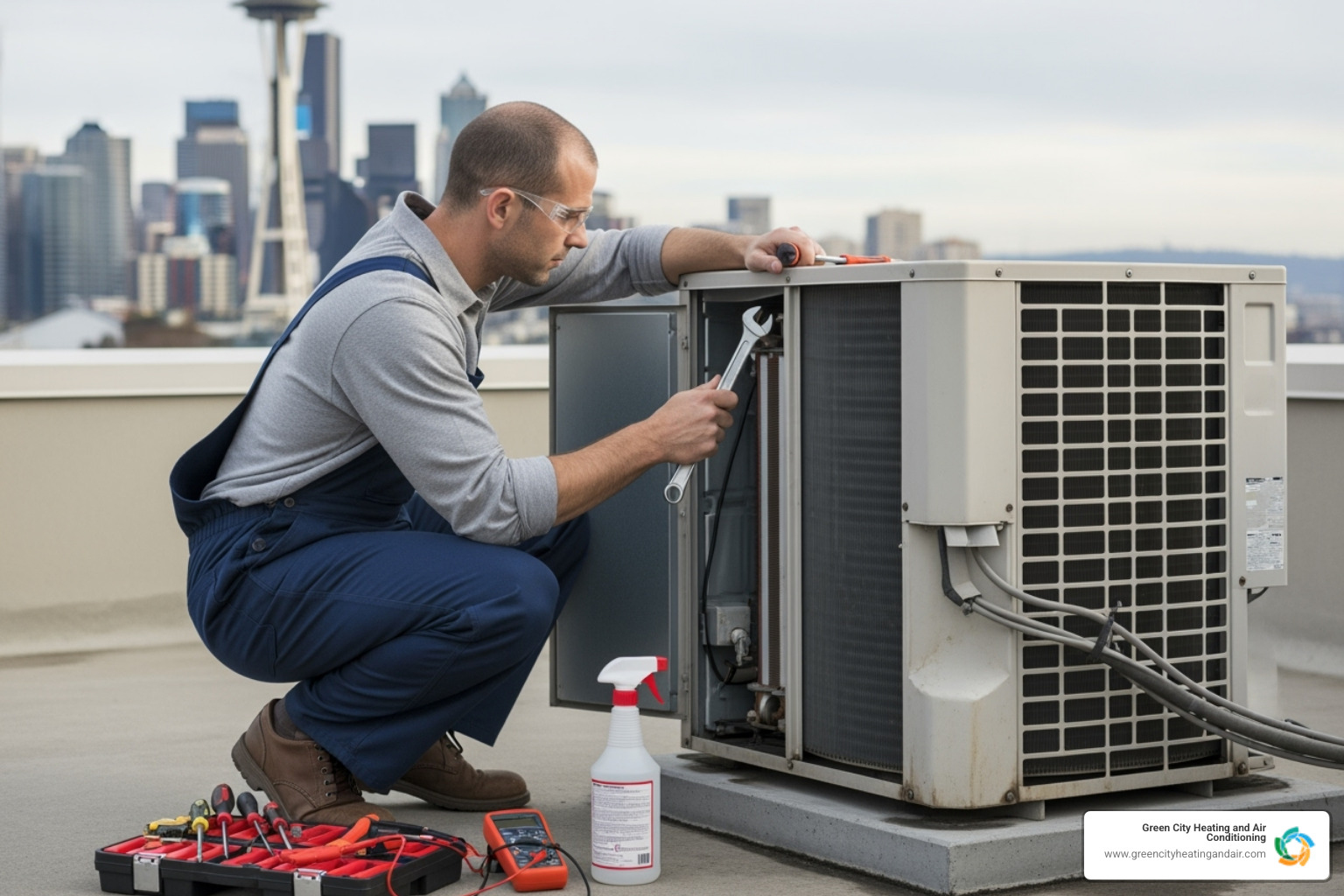Why Understanding AC Repair Costs Matters for Your Budget
AC repair cost can catch homeowners off guard, especially during the peak summer months when your cooling system decides to quit. According to recent industry data, most homeowners pay between $171 and $660 for common AC repairs, with the national average sitting around $415.
Quick AC Repair Cost Overview:
- Service call/diagnostic fee: $75 - $200
- Minor repairs: $75 - $400 (filters, fuses, drain lines)
- Moderate repairs: $150 - $700 (capacitors, motors, thermostats)
- Major repairs: $600 - $2,800 (compressors, coils, refrigerant leaks)
- Labor rates: $75 - $150 per hour (regular hours)
- Emergency service: $160 - $250 per hour
When your air conditioning goes out in the heat of the summer, you don't always have time to call around for different quotes or research what you can expect to pay. This reality hits many King and Pierce County residents every year.
Understanding these costs ahead of time helps you make informed decisions when your AC breaks down. You'll know whether that repair quote is fair, when it makes sense to replace instead of repair, and how to budget for both expected maintenance and unexpected breakdowns.
The factors that influence your final bill go beyond just the broken part. Your unit's age, type of refrigerant, warranty status, and even the time of year all play a role in determining what you'll pay.
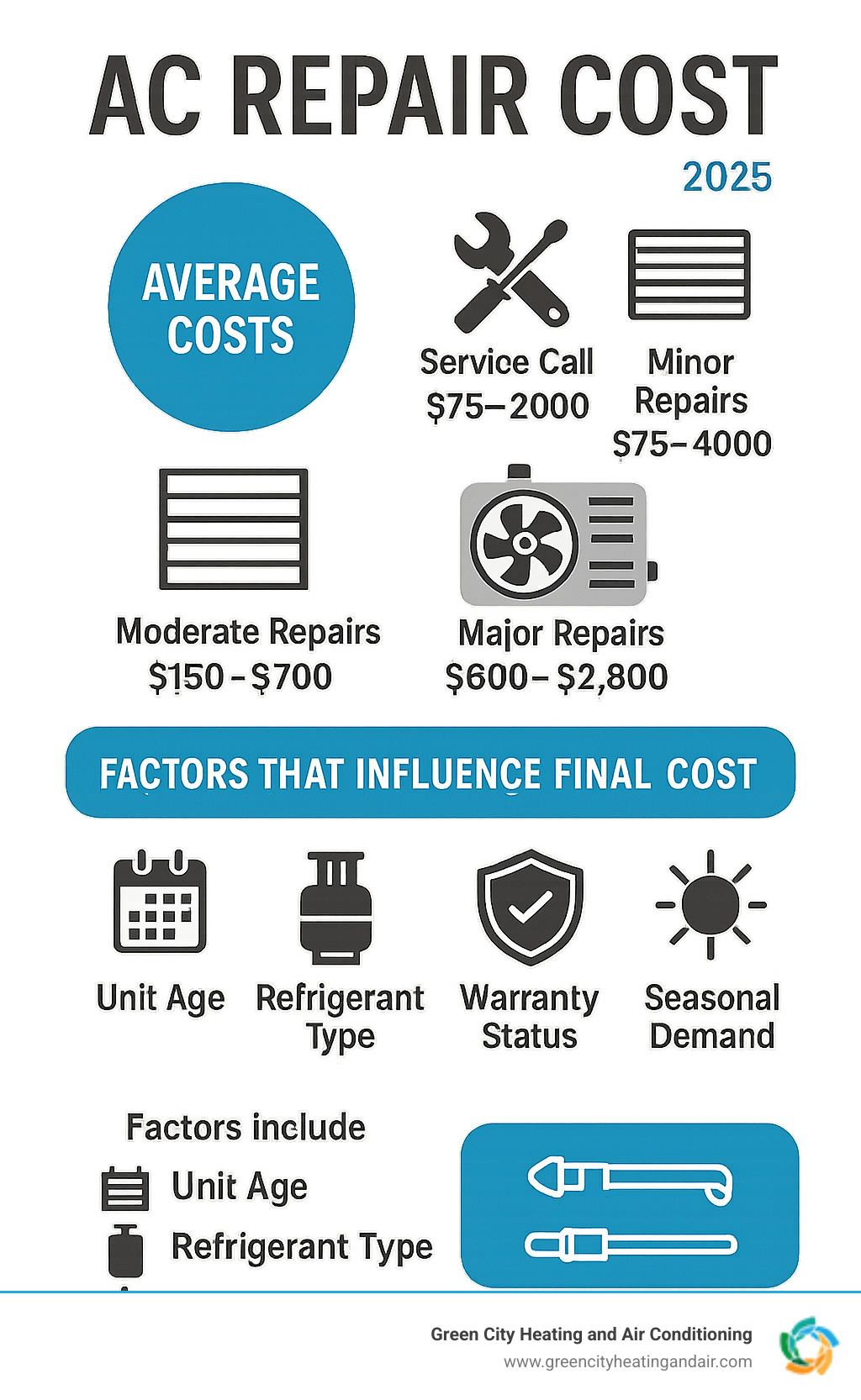
What to Expect: Average Costs and Initial Fees
When your air conditioner unexpectedly quits, your first thought is getting it running again and what it will cost. We understand the AC repair cost can feel like a mystery, so we're here to explain the typical charges you might encounter.
The journey to a cool home usually begins with a service call or diagnostic fee. This initial charge covers the technician's time and travel to your home. It also includes the crucial diagnostic work needed to pinpoint the exact problem. Think of it as the detective work before the repair. While the average cost for this initial step can vary, it's an essential first step to understanding what's going on with your system.
Beyond this initial fee, your bill will include labor costs for the technician's expertise and the price of any parts needed. If your AC decides to go out during off-hours, weekends, or holidays, you might also encounter emergency service fees. These are often a bit higher due to the immediate nature of the service. For a detailed look at how these costs can add up, you might find this guide on How Much Does Repairing an Air Conditioning Condenser Cost? - CostHelper helpful.
Understanding the Service Call Fee
The service call fee, sometimes called a trip charge, is a foundational part of any AC repair bill. It's not just about the technician showing up at your door! It covers the time and travel needed to get to your home in King, Pierce, or Snohomish Counties. It also includes the initial assessment. Our experienced technicians use this time to carefully diagnose the issue. They leverage over 30 years of collective experience to accurately identify what's causing your discomfort.
This fee often covers the first hour of diagnostic work. Many companies, including Green City Heating and Air Conditioning, may apply this fee towards the total AC repair cost if you move forward with the recommended repairs. This means you're not paying twice for the initial visit. It's a transparent way to ensure our experts can dedicate the necessary time to properly assess your system, whether it's a simple fix or something more complex.
How Labor and Emergency Fees Impact Your Bill
Labor is a significant part of your overall AC repair cost. Our skilled technicians charge standard hourly rates during regular business hours. These rates reflect their extensive training and certifications, like NATE and EPA 608. They also cover the specialized tools they use to perform repairs safely and effectively. We never subcontract our work. This means you can always trust that a highly trained and loyal member of our team is serving you.
However, air conditioners don't always break down at convenient times. When you need urgent service outside of regular business hours—such as late evenings, weekends, or holidays—emergency fees typically apply. These rates are higher to compensate technicians for working during non-standard times. While we always aim to provide prompt service, understanding these potential differences in labor rates can help you prepare for the total AC repair cost. The complexity of the repair and the time it takes to complete also directly influence the labor portion of your bill.
Key Factors That Influence Your Final Bill
When your AC breaks down, you might think the AC repair cost is straightforward—find the problem, fix it, done. But the reality is a bit more nuanced. Think of it like taking your car to the mechanic: a simple oil change is one price, but if you drive a vintage sports car that needs special parts, you're looking at a whole different ballgame.
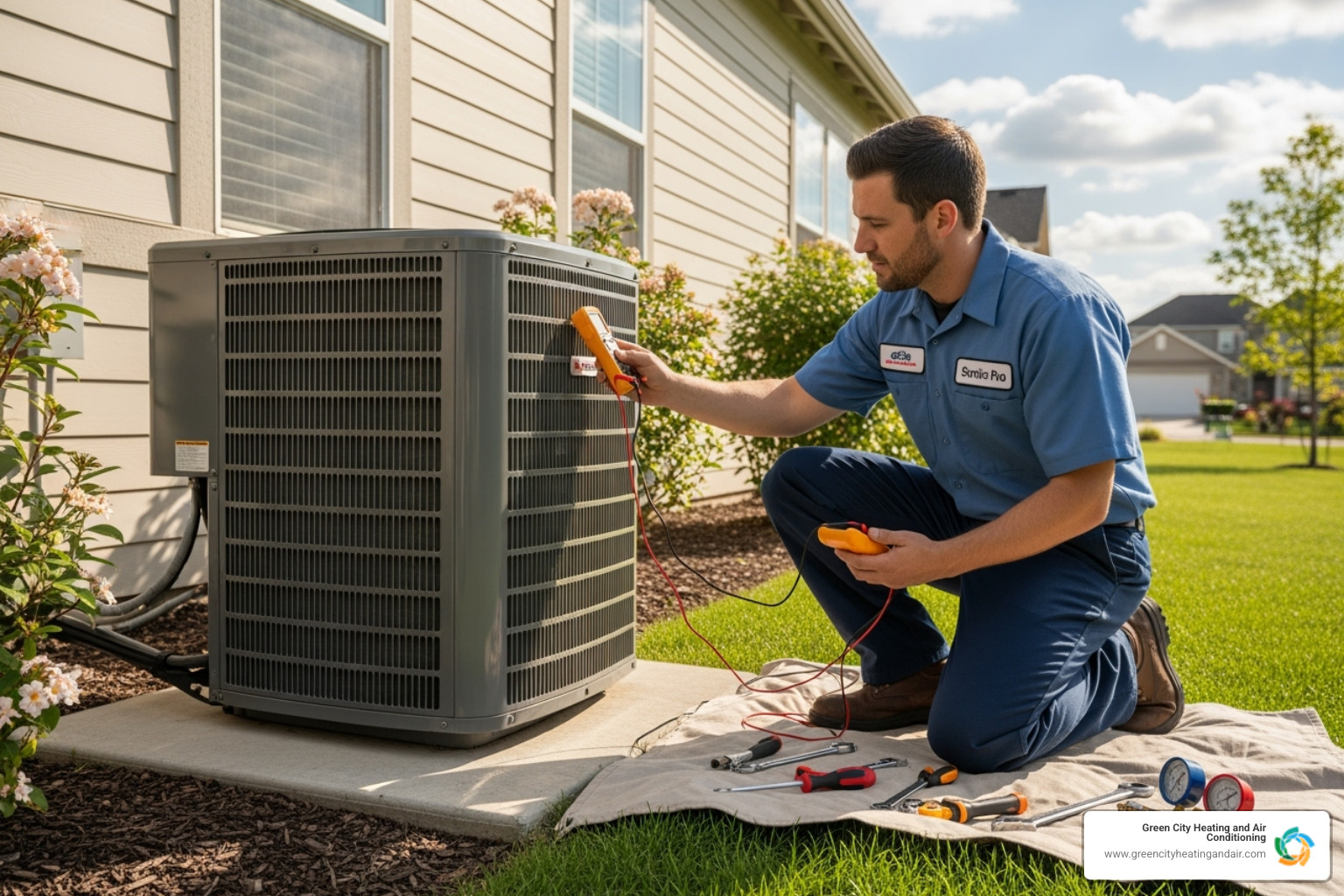
Your final bill depends on several key factors that can either work in your favor or add unexpected costs. The type of AC system you have, how old it is, whether it's still covered by warranty, how easy it is for our technicians to access, what kind of refrigerant it uses, and even the time of year you need service all play important roles.
Understanding these factors ahead of time helps you make sense of repair quotes and avoid any surprises when the bill arrives.
AC Unit Type and Age
Your AC system type makes a real difference in repair complexity and cost. Central air conditioning systems are the workhorses we see most often in King, Pierce, and Snohomish County homes. These systems have ductwork throughout your house and typically require different expertise than ductless mini-split systems, which have individual units mounted on walls.
Each system has its own personality, so to speak. Mini-splits might need specialized parts that aren't as common, while central systems might require more extensive labor if the problem involves ductwork or components in hard-to-reach places.
Age is where things get interesting—and potentially expensive. Units that are 12-15 years old or more start showing their age in ways that affect your wallet. Older units break down more frequently, and finding replacement parts becomes like hunting for vintage car parts. Sometimes the parts are available but pricey, and sometimes they're just not made anymore.
Here's where it gets particularly tricky: many older systems still use R-22 Freon, which is being phased out for environmental reasons. If your system needs refrigerant and uses R-22, you're looking at significantly higher costs compared to newer units that use R410A refrigerant. It's like the difference between finding regular unleaded gas and trying to buy aviation fuel—one is everywhere and affordable, the other is specialized and costly.
Warranty and Accessibility
Warranty coverage can be your best friend when facing unexpected repairs. Most newer AC units come with a manufacturer's warranty that covers parts for several years, which is fantastic news for your budget. However—and this is important—these warranties typically don't cover labor costs. You're covered for the part itself, but you'll still pay for our technician's time and expertise to install it.
Some homeowners also have home warranty plans that might cover AC repairs, though coverage varies widely between plans. We always recommend checking what your specific plan covers before assuming you're protected. Labor warranties from your installing contractor can also provide additional peace of mind, covering the work itself beyond just the parts.
Accessibility is one of those factors that might not cross your mind until it becomes an issue. An outdoor condenser unit sitting on a concrete pad next to your house? That's a technician's dream—easy to reach, plenty of working space, and straightforward access to all components.
But if your system is tucked away in a cramped attic or squeezed into a tight crawlspace, that's a different story. These challenging locations mean our technicians need more time to safely access the unit, potentially special equipment to work in confined spaces, and extra care to avoid damage to your property. More time and complexity naturally translate to higher labor costs.
Our experienced team is equipped to handle these tricky situations—we've seen it all in our 30+ years of service. Whether your unit is hiding in the most inconvenient corner of your attic or perched on a rooftop, we'll get the job done safely and efficiently.
Common AC Problems and Their Estimated AC Repair Cost
When your AC isn't performing as it should, it's often signaling a specific problem. Recognizing these common symptoms can give you an idea of what might be going on and the potential AC repair cost involved. Is your AC blowing warm air, making strange noises, or leaking water? These are all clues that something's amiss.
Common AC failure symptoms include:
- Warm air blowing from vents
- Weak airflow
- Strange noises (grinding, hissing, clanking, buzzing)
- Unpleasant odors (mildew, burning)
- Water leaks around the indoor or outdoor unit
- Short cycling (unit turning on and off too frequently)
- Unit not turning on at all
- Increased energy bills
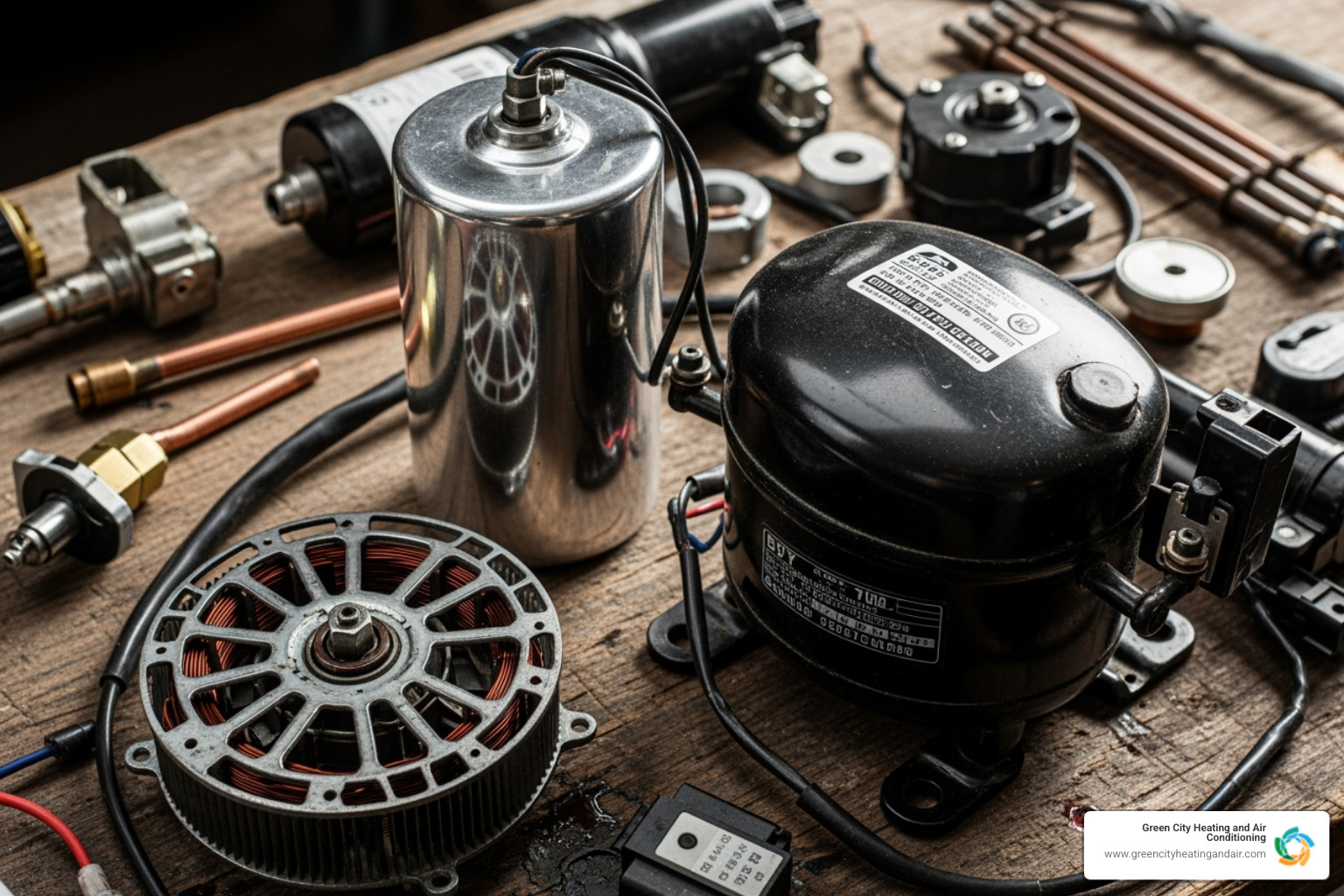
While we can't give exact figures without a diagnosis, we can categorize repairs by their typical complexity and associated expenses.
Minor Repairs: Fuses, Filters, and Lines
Sometimes, the culprit behind your AC woes is surprisingly simple. These minor issues generally come with a lower AC repair cost because they involve less complex parts and quicker fixes.
- Fuse or breaker replacement: If your outdoor unit suddenly stops working, a tripped circuit breaker or a blown fuse might be the cause. This is often a quick fix for our technicians.
- Clogged air filter: A dirty air filter restricts airflow, making your AC work harder and less efficiently. Regularly changing or cleaning your air filter is a simple DIY task that can prevent bigger problems and save you money.
- Drain line flush: The condensate drain line can get clogged with algae, leading to water leaks and potential damage. A professional flush can clear the blockage and prevent future issues.
- Condensate drain pump: If your AC unit is in a location where gravity can't drain the condensate, a pump is used. If this pump fails, it can lead to leaks.
- Thermostat replacement: A faulty thermostat can lead to inconsistent cooling or your AC not turning on at all. Replacing it can restore proper function. While some modern thermostats offer advanced features, even basic replacements are usually straightforward.
Moderate Repairs: Capacitors, Contactors, and Motors
These repairs involve essential electrical or mechanical components that, while not as costly as a full compressor replacement, require professional expertise and can contribute moderately to your overall AC repair cost.
- Capacitor replacement: The capacitor is like a battery that provides the initial jolt of electricity to start your AC's motors (fan and compressor). If it fails, your unit might hum but not start. Replacing a faulty capacitor is one of the most common AC repairs we perform.
- Contactor replacement: The contactor is an electrical switch that controls the flow of power to the compressor and outdoor fan. A worn-out contactor can prevent your unit from turning on or cause it to short cycle.
- Fan motor repair: Both the indoor blower fan motor and the outdoor condenser fan motor are crucial for proper airflow and heat exchange. If either motor is making strange noises or failing to spin, it might need repair or replacement. Our technicians can often diagnose whether a repair is feasible or if a full replacement is necessary.
- Blower motor replacement: The blower motor pushes conditioned air through your home's ductwork. A failing blower motor can lead to poor airflow and uneven temperatures, requiring replacement.
Major Repairs: Leaks, Coils, and Compressors
These are the big ones, often leading to the highest AC repair cost because they involve complex procedures, specialized tools, and expensive parts.
- Refrigerant leak detection: Refrigerant is the lifeblood of your AC, absorbing heat from inside your home and releasing it outside. A leak means your system can't cool effectively. Detecting these leaks can be challenging and time-consuming, requiring specialized equipment.
- Refrigerant recharge: Once a leak is detected and repaired, the system needs to be recharged with the correct type and amount of refrigerant. As mentioned, the cost of R-22 Freon (for older units) is significantly higher than R410A due to its phase-out.
- Evaporator coil replacement: Located in your indoor unit, the evaporator coil absorbs heat from your home's air. If it's severely damaged, corroded, or has multiple leaks, it might need to be replaced. This is a significant repair, often requiring extensive labor.
- Compressor replacement: The compressor is the heart of your AC system, responsible for circulating refrigerant. It's the most expensive component to replace. If your compressor fails, the repair can be substantial, and sometimes it makes more financial sense to consider a full system replacement rather than just replacing the compressor.
- For those considering major repairs or a new system, exploring More about energy-efficient systems can help you understand the long-term savings of upgrading.
Repair or Replace? Making the Smart Financial Choice
When facing a hefty AC repair cost, you're at a crossroads every homeowner eventually faces: should you fix your current system or replace it? It's a decision that can keep you up at night, especially if your AC isn't working.
| Feature | Repair | Replace |
|---|---|---|
| Initial Cost | Lower | Higher |
| Longevity | Extends current unit's life (short-term) | New lifespan (12-15+ years) |
| Efficiency | Remains same, potentially degrades over time | Significantly improved (higher SEER ratings) |
| Comfort | Restores current comfort level | Improved, more consistent cooling |
| Warranty | Varies by repair/part, often limited | Full new warranty on parts and labor |
| Reliability | May lead to more frequent future repairs | Highly reliable, fewer breakdowns |
| Energy Bills | No change or slight increase | Significant reduction |
| Environmental Impact | Minimal immediate impact | Reduced carbon footprint (with high-efficiency) |
The truth is, there's no one-size-fits-all answer. The right choice depends on your unit's age, how often it's been breaking down, and its current energy efficiency. Think of it like deciding whether to keep fixing your old car or finally trading it in for something more reliable.
We've helped thousands of homeowners in King, Pierce, and Snohomish Counties steer this decision over our 30+ years in business. Sometimes repair makes perfect sense. Other times, replacement is clearly the smarter financial move. The key is looking at the bigger picture, not just the immediate AC repair cost.
The $5,000 Rule and Other Guidelines
Over the years, we've found that certain guidelines help homeowners make this decision with confidence. These aren't hard rules, but they're helpful starting points.
The $5,000 Rule is probably the most well-known. Here's how it works: multiply your repair cost by your system's age in years. If that number exceeds $5,000, replacement usually makes more sense. So if you're looking at a $400 repair on a 13-year-old unit, that's $400 x 13 = $5,200. That suggests it's time to start shopping for a new system.
The 50% Rule is even simpler. If your AC repair cost is half (or more) of what a new system would cost, replacement typically wins. Investing that much money into an aging system rarely makes financial sense, especially when other components might fail soon.
System lifespan matters too. Most AC units last 12-15 years with proper maintenance. If your system is pushing that age and needs major repairs, you're probably looking at the beginning of the end. One major repair often signals that others are coming.
The long-term savings from a new, efficient system can be substantial. While the upfront cost stings, those monthly energy bill reductions add up quickly. A new system with a higher SEER rating can save you hundreds of dollars per year in energy costs.
Considering an Upgrade
Sometimes the best response to a major AC repair cost is to see it as an opportunity rather than just an expense. Upgrading to a new system brings benefits that go way beyond just fixing what's broken.
Energy savings are often the biggest motivator. Modern AC systems are incredibly efficient compared to units from even 10 years ago. A new high-SEER system can cut your cooling costs dramatically. We've seen homeowners reduce their summer electric bills by 30-40% or more after upgrading.
Improved comfort is something you'll notice immediately. New systems provide more consistent temperatures throughout your home, better humidity control, and much quieter operation. No more rooms that are too hot or too cold, and no more listening to your old system struggle and groan.
New warranties give you peace of mind for years to come. Instead of worrying about the next breakdown, you can relax knowing you're covered. Our installations come with comprehensive warranties that protect your investment.
Smart thermostats can be integrated with your new system, giving you precise control and even more energy savings. You can adjust your home's temperature from anywhere using your smartphone, and many models learn your schedule to optimize efficiency automatically. Check out the latest options for smart thermostats to see what's available.
Environmental impact matters too. A more efficient system reduces your carbon footprint significantly. If being environmentally responsible is important to you, upgrading is one of the most impactful changes you can make to your home. You can learn more about energy-efficient systems and their environmental benefits.
The decision between repair and replace isn't always easy, but it doesn't have to be overwhelming. Our experienced team can walk you through the numbers and help you understand what makes the most sense for your specific situation and budget.
Frequently Asked Questions about AC Repairs
We understand that when your air conditioner breaks down, you probably have a dozen questions racing through your mind. After over 30 years in the business, we've heard them all! Let's tackle the most common concerns about AC repair cost and everything else that comes with getting your cooling system back up and running.
How can I prevent expensive AC repairs in the future?
The best way to avoid sticker shock from unexpected AC repair cost is to think of your air conditioner like your car—it needs regular care to run smoothly. We've seen countless homeowners save hundreds, even thousands of dollars simply by staying on top of basic maintenance.
Regular maintenance is your best friend here. Scheduling an annual professional tune-up, ideally in the spring before you really need your AC, allows our technicians to spot small issues before they become wallet-draining emergencies. During these visits, we're essentially giving your system a physical exam, catching things like worn parts or refrigerant levels that are starting to drift.
Changing your air filters might seem like a small thing, but it's huge for preventing costly breakdowns. A dirty filter is like trying to breathe through a straw—your system has to work overtime, which wears out components faster. We recommend changing filters every 1-3 months, or more often if you have furry family members or deal with allergies.
Don't forget about keeping your outdoor unit clear of debris. Leaves, grass clippings, and overgrown shrubs can block airflow and force your system to work harder than it should. A quick check every month can prevent bigger problems down the road.
Most importantly, address issues promptly when you notice them. Strange noises, weird smells, or rooms that just won't cool down are your AC's way of asking for help. Ignoring these early warning signs is like ignoring that funny noise your car makes—it rarely ends well or cheaply.
How long does a typical AC repair take?
This is one of the first questions homeowners ask, and honestly, it depends on what's wrong with your system. Repair time varies quite a bit based on the complexity of the problem and whether we have the right parts on our truck.
For simple fixes like replacing a blown fuse, clearing a clogged drain line, or swapping out a capacitor, you're usually looking at 1-2 hours tops. These are the repairs that make us happy because they get you back to comfort quickly without a big dent in your budget.
Major replacements are a different story entirely. If your compressor has given up the ghost or your evaporator coil needs replacing, plan on 4-8 hours or potentially longer. These complex jobs require careful work and sometimes specialized equipment. Part availability can also affect timing—while we stock many common parts on our trucks, some components might need to be ordered, which could extend the repair timeline.
We always give you an honest estimate of how long we expect the work to take, and we keep you updated if anything changes along the way.
Should I tip my AC repair technician?
Here's the short answer: tipping is not required for AC repair work, but it's definitely appreciated when technicians go above and beyond. Our team takes pride in providing excellent service because that's simply how we do business—your satisfaction is what matters most to us.
That said, if you feel your technician provided exceptional service—maybe they worked in sweltering heat, took extra time to explain everything clearly, or solved a particularly tricky problem with skill and patience—a tip is a thoughtful way to show your appreciation. Working in extreme conditions like a blazing hot attic or during a heat wave can be pretty tough on our crew.
Sometimes the best tip isn't money at all. Offering a cold drink on a scorching day or simply saying thank you for a job well done means more than you might think. Our technicians are passionate about what they do, and knowing they've made a difference in your comfort is often the best reward.
Conclusion
Navigating AC repair cost doesn't have to be a stressful experience. By understanding the factors that influence your bill, the common issues that arise, and when it makes sense to repair versus replace, you empower yourself to make informed decisions for your home and budget.
We've explored how initial service call fees, labor rates, and emergency charges contribute to the overall cost. We've also highlighted how your AC unit's type, age, warranty status, and accessibility can sway the final price. From minor fixes like filters and fuses to major undertakings like compressor replacements, each repair has its own set of considerations.
Proactive maintenance is your best defense against unexpected and costly breakdowns. Regular tune-ups and timely attention to minor issues can significantly extend the life of your system and keep your family comfortable.
At Green City Heating and Air Conditioning, we're a local, family-owned business dedicated to providing comprehensive HVAC solutions in King, Pierce, and Snohomish Counties. With over 30 years of experience, we never subcontract, ensuring that a loyal, skilled member of our team puts your comfort first. We're here to help you understand your options, provide transparent service, and ensure your home stays cool when you need it most.
Don't let a malfunctioning AC unit leave you sweating. Schedule your AC service today and let us bring comfort back to your home.
More Blogs
Latest
insights and tips
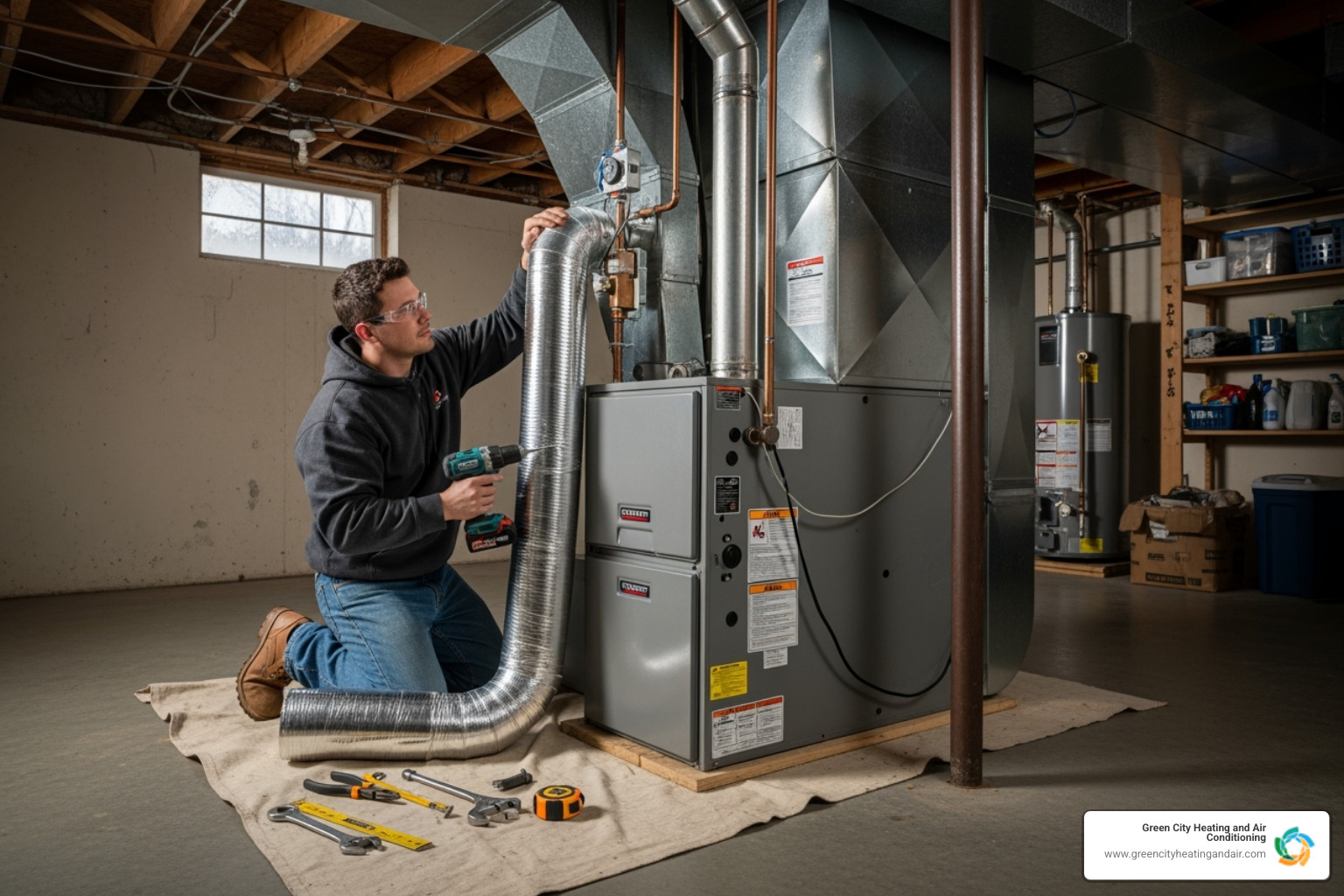
Warmth Unleashed: The Ultimate Seattle Furnace Installation Handbook
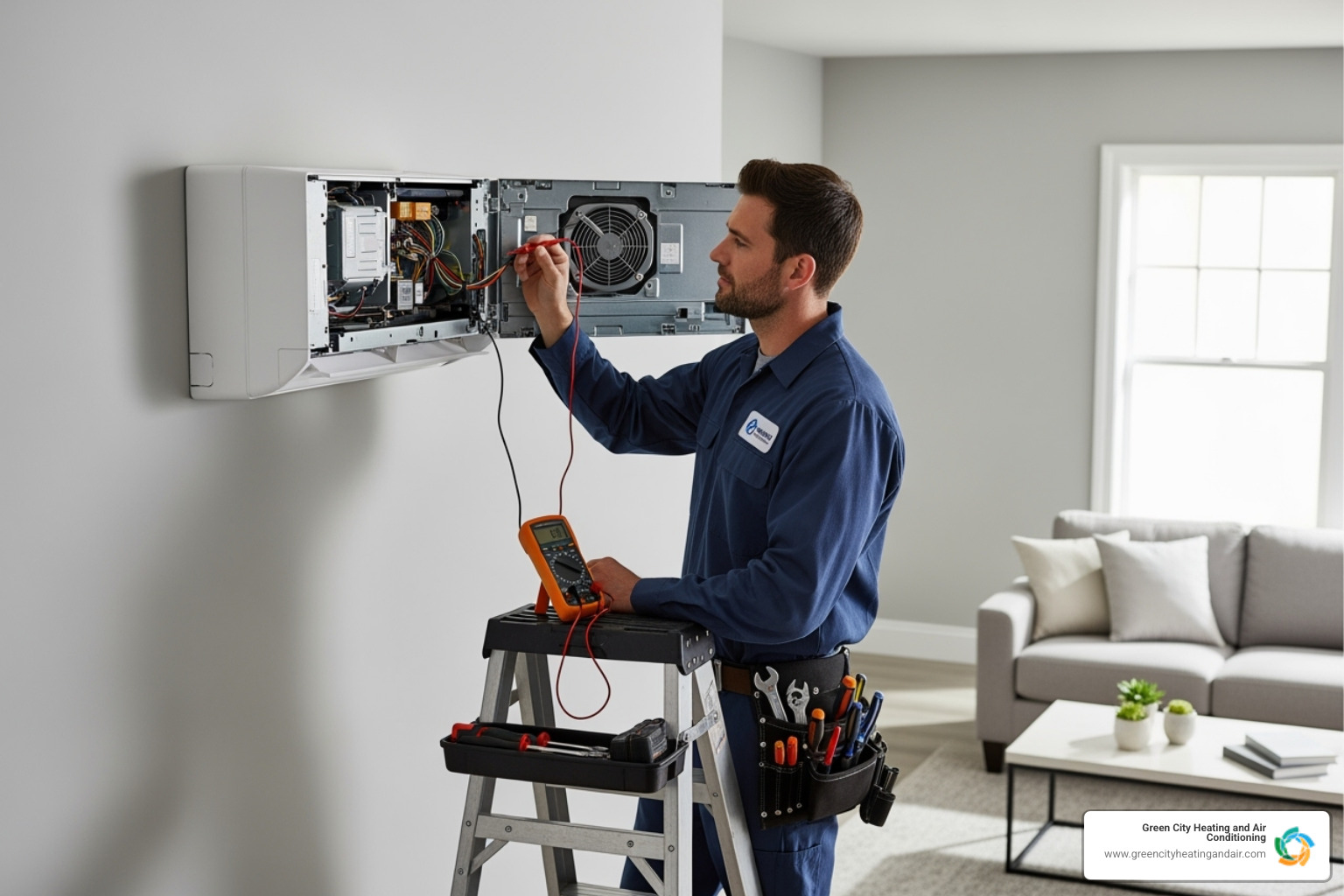
Emergency Ductless AC Repair in Bellevue: Get Your Cool Back Fast
